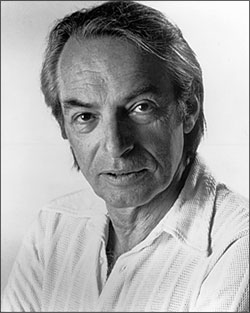

  |
|
|
||||||||||||||||||||||
|
OBITUARY... March 4, 2008 Leonard Rosenman Dead at 83 Maverick composer wrote innovative, influential film scores by Jon Burlingame  The composer of East of Eden, Rebel Without a Cause and Fantastic Voyage, who won Academy Awards for Barry Lyndon and Bound for Glory, suffered a heart attack and passed away early Tuesday, March 4, at the Motion Picture and Television Country House & Hospital in Woodland Hills, Calif. Rosenman, who also won Emmys for his television scores for Sybil and Friendly Fire and composed the memorable themes for The Defenders, Combat! and Marcus Welby, M.D., will be remembered as the New Yorker who shook up the status quo of Hollywood music in the 1950s with his sophisticated approach to film music. He applied serial techniques, atonality, microtonality and other avant-garde ideas to movie music during his four decades in the business. Rosenman was born in Brooklyn on Sept. 7, 1924, and began playing the piano during his teen years. After the war, he moved to California, where he studied with Arnold Schoenberg and Roger Sessions; and in 1952, he received a fellowship to study with Italian composer Luigi Dallapiccola at Tanglewood in Massachusetts. Widely regarded as one of the most promising young composers in America, Rosenman was teaching piano and writing chamber music in New York when director Elia Kazan invited him to compose the score for East of Eden (1955). It was an auspicious debut, and while the score ranged from the simple, folk-inspired Americana of the main theme to dissonance in depicting the adults of the story, Rosenman's next assignment would demonstrate that a bold new voice had arrived in Hollywood. Producer John Houseman hired him for his psychiatric-clinic drama The Cobweb (1955) – over the protests of the MGM music department – and the result was the first predominantly twelve-tone score for a major studio feature. Rosenman was never a Hollywood favorite and remained a maverick, charting his own course. He rarely endeared himself to producers and directors, sometimes publicly chastising them for their musical ignorance and serious lack of taste. But he managed to make his voice heard, and to use feature-film assignments as experimental laboratories for advanced musical ideas that reached fruition in his concert work – something that Rosenman never forsook. He wrote a startlingly contemporary atonal score for Fantastic Voyage (1966), a movie about miniaturized human beings who undertake a trip inside the bloodstream of a human body, and Sioux-inspired music, incorporating Native American flutes, percussion and voices, for A Man Called Horse (1970). For the TV-movie Sybil (1976), he experimented with microtonality, electronics and children's voices to illustrate a woman's split personality, winning an Emmy for his efforts. Sci-fi and fantasy films proved especially receptive vehicles for Rosenman's musical ideas: A bizarre choral "Mass for The Holy Bomb" for Beneath the Planet of the Apes (1970); eerie marches and wild battle music for the Golden Globe-nominated score for Ralph Bakshi's animated version of J.R.R. Tolkien's The Lord of the Rings (1978); and a delightful, Oscar-nominated score for Star Trek IV: The Voyage Home (1986) that incorporated a joyous, Bach-style fugue for the endangered whales that the Enterprise crew must rescue in the time-traveling plot. His other genre scores, many of which have become cult movies, included Battle for the Planet of the Apes (1973), Race With the Devil (1975), The Car (1977), Prophecy (1979) and Robocop 2 (1990).  His TV scores ran the gamut, from the triumphal brass fanfare for the legal profession in The Defenders (1961) to the complex, Ligeti-style "tortured crawling" music – Rosenman's words – for the World War II drama Combat! (1962) and the diverse musical needs of seven seasons of the Robert Young doctor series Marcus Welby, M.D. (beginning in 1969). His other TV series included Law of the Plainsman (1959), Garrison's Guerillas (1967) and Gibbsville (1976). Rosenman's last feature film score was for Jurij (2001), an Italian film about a young violinist. It came just four years after the premiere of his second violin concerto, one of many concert works that continued to occupy the composer when he wasn't writing music for films or TV. His multiple chamber works and other music for the concert hall are being preserved for posterity as part of the Leonard Rosenman Collection at New York University. His final public appearance was at a May 2005 concert at Walt Disney Concert Hall, where the Los Angeles Philharmonic played excerpts from his Rebel Without a Cause score to audience acclaim. Survivors include his wife, Judie Gregg Rosenman; three children and four grandchildren. A memorial service is being planned. In lieu of flowers, the family has suggested donations to the Association for Frontotemporal Dementias (www.ftd-picks.org) or the Motion Picture & Television Country House and Hospital. ©2008 Jon Burlingame |
Search
Past Features
|